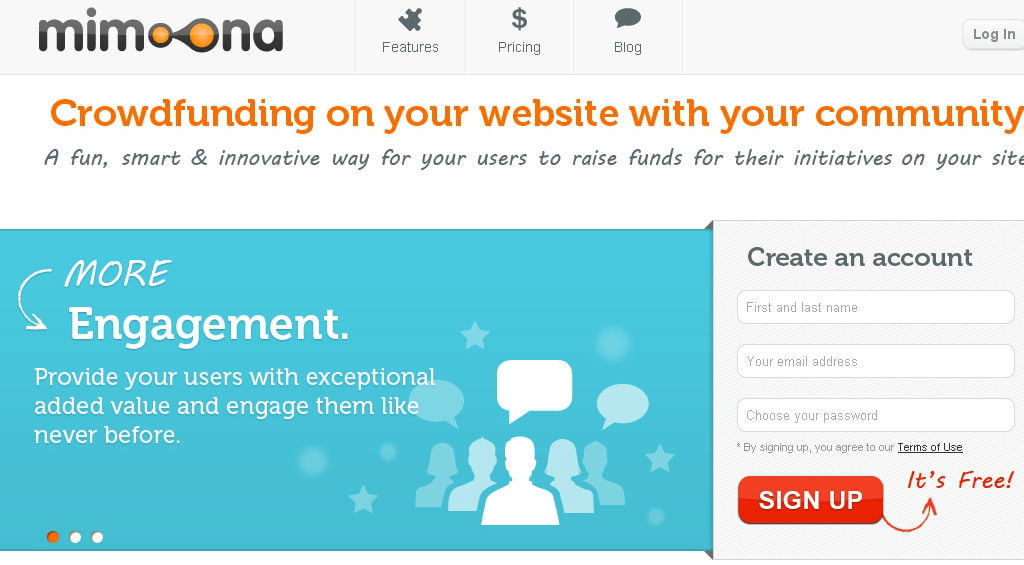Crowdfunding is the new buzzword and anyone with little more than an idea can jump on the bandwagon. All they need is come up with a concept; describe it in a video or blob of text; post it to one of the many popular crowdfunding websites (like Kickstarter) and see if the crowd likes it enough to fund it.
Now Israel is the latest player to hop on with its own equivalent of Kickstarter, called Mimoona (Mimoona is the Hebrew word for “funding” and also a sweet-filled celebration to break the Jewish holiday of Passover.) The site, founded by Nadav Trenter Moser and Arik Marmorstein, has already seen more than NIS 2 million ($ 560,000) in projects funded by the crowd, which has allowed the startup to remain self-funded by taking commissions.
But Trenter Moser and Marmorstein say they’ve done things differently. According to them, the abundance of projects looking for crowdfunding sometimes stops those with merit reaching the funds they need. That’s how they came up with the concept of “Plug & Fund” to make asking for money over the internet that much easier.
Related articles
- Israeli Startup Roomer Can Help You Get Rid Of Hotel-Room Cancellation Fees
- ‘Big Data’ A Little Less Big, Thanks To Israel’s SiSense
Instead of bringing in the crowds – be where the crowds are
The Plug & Fund platform (see example here), still in beta stage, sets out to solve some inherent problems with crowdfunding. “The major problem is a marketing problem,” the founders tell NoCamels. “People upload projects to crowdfunding websites and then need to generate traffic, but most people do not know how to go about making their project stand out.”
Indeed, if you know anyone who has ever put up a crowdfunding effort, they will tell you that the most difficult part is attracting enough traffic to the project. (This is probably because the majority of people do not spend their time looking for home-grown projects to spend their money on.)
In order to help crowdfunded projects attract more attention, the Plug & Fund platform makes it possible, according to Trenter Moser, to get traction from audiences on major websites as they browse: “Instead of driving traffic to your project, why not put your project where there is already relevant traffic and where there is a greater chance to raise funds?” So basically, Mimoona can create a crowdfunding platform for whichever company that wants to host one on their website.
If a budding artist were seeking funds to create a piece of art, they would no longer need to compete for attention on crowdfunding websites that cater to every genre under the sun. Instead, they could have their crowdfunded project grace the homepage of major art websites where their project might have a better chance to receive the special attention it needs to succeed.
Sign up for our free weekly newsletter
SubscribeBecoming the white label of crowdfunding
Trenter Moser points out that by creating a crowdfunding platform for our favorite websites the problem of crowdfunding traffic can be solved: “The added value of putting these platforms into certain websites is that they are content-based and have wide communities of visitors.”
Yet the added value in the Plug & Fund platform is not only for the project creator, but also for the host website and even Mimoona.com. As more people fund the projects that well-known websites post, the website itself can decide if it wants to take five or 10 percent of the profits for the use of its “advertising space,” and Mimoona takes an additional half of whatever the site makes. This addition to the Plug & Fund platform shows that crowdfunding is no longer really a “by the people from the people” kind of endeavor, and is increasingly becoming another avenue for web-based profit.
Whatever the implications of Plug & Fund for the future of genuine crowdfunding, Trenter Moser promises that it is extremely easy for any website community to open up their own crowdfunding platform and that Mimoona doesn’t even have to manage it. The fact that the sites manage all of their content may make the crowdfunding process more selective for the ideas that seem the most fundable. Mimoona simply stands on the sidelines waiting for the major websites’ brand names to work their magic.
Looking for sweet success
The idea behind Mimoona’s Plug & Fund may seem novel, but a number of companies have already learned the value of “white label crowdfunding” and begun to reap in the profits. With companies like Launcht, Selfstarter and IgnitionDeck already offering a variety of crowdfunding options for websites and individuals alike, Mimoona will have to expand its options in order to compete in the growing market of crowdfunding.
Set for public release in the next months, Mimoona’s home-grown crowdfunding business may soon be reason for a sweet celebration by eager project creators everywhere.
Related posts

Editors’ & Readers’ Choice: 10 Favorite NoCamels Articles

Forward Facing: What Does The Future Hold For Israeli High-Tech?

Impact Innovation: Israeli Startups That Could Shape Our Future




Facebook comments